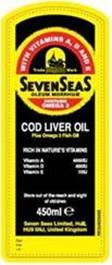
In what is believed to be the first case of its kind, the Ethiopian Supreme Court has issued a decision recognizing rights in an unregistered label trade mark in the context of opposition proceedings which culminated in an appeal to that court
The Appellant in this case was The Procter & Gamble Company, or P&G, which owns the registered trade mark SEVEN SEAS in Ethiopia. The SEVEN SEAS product is a supplement made from cod liver oil and it is distributed, sold and advertised in packaging (depicted below), consisting of a combination of colours, namely black, yellow and red and certain distinctive design elements. P&G acquired the SEVEN SEAS product and associated intellectual property rights from Merck KGaA (”Merck”) towards the end of 2018. First sales of the supplement in Ethiopia date back to 1996.
In 2018 it came to the attention of Merck KGaA, then owner of the SEVEN SEAS supplement and trade marks, that an entity called Clap Industries Pvt Limited (“Clap”), had been selling a supplement in Ethiopia under the mark HEALTH 1st with a label that mimicked the label of the SEVEN SEAS supplement. This label is also depicted below. At the time, the SEVEN SEAS product had not been sold in Ethiopia for a period of approximately two years and it seems that Clap had tried to take advantage of that interruption in sales. It was also discovered that Clap had applied to register its label trade mark in Ethiopia in class 5. As can be seen from the images, the labels had the same colour combination and very similar to identical design elements. With a view to protecting the reputation and goodwill acquired in the SEVEN SEAS label trade mark, Merck opposed the registration of the HEALTH 1st label trade mark.
 vs
vs 
The opposition was based on largely untested grounds in Ethiopia. Because the word marks SEVEN SEAS and HEALTH 1st were different, the opposition relied heavily on unregistered rights acquired in the label of the product through use. The legislation in Ethiopia does recognise that well-known marks are deserving of protection, but Ethiopia is not a member of the Paris Convention for the Protection of Industrial Property which envisages protection for unregistered, well-known marks. Consequently, the opposition had to be based on prior use and the resultant residual reputation acquired in the SEVEN SEAS label trade mark. The Opposition was defended with Clap trying to make much of the fact that the SEVEN SEAS label trade mark had not been in use when its HEALTH 1st product entered the market. Among other things, Clap argued that there could be no reputation in the SEVEN SEAS label trade mark, due to its non-use over a period of time and that rights can only be asserted in registered trade marks.
The Directorate of the Ethiopian Intellectual Property Office (“the EIPO”) dismissed the opposition and an appeal to the Intellectual Property Tribunal of the EIPO was similarly dismissed. The Directorate was swayed by the argument that there could be no protection for a mark based on user rights, the use of which had been discontinued, despite Merck having provided cogent reasons for the temporary discontinuation and having confirmed that it had no intention to abandon the product or its right in and to the SEVEN SEAS label trade mark. In addition, the rulings issued by both the Directorate and Tribunal did not include any comparison between the parties’ marks, which is the point of departure in any trade mark dispute.
On appeal to the Federal Supreme Court, P&G adduced evidence to show that, even during the period that importation of the SEVEN SEAS product had ceased temporarily in Ethiopia, the products remained in the market due to their lengthy lifespan and, consequently, the label remained in use. In early December 2021, the Supreme Court issued a unanimous decision reversing the decisions of the Directorate and Tribunal of the EIPO and the Federal High Court. It criticised the decisions for misconstruing the issues for determination and confirmed that the long-standing use of the SEVEN SEAS label mark had resulted in user rights in the mark that are entitled to protection, notwithstanding the lack of registration. The Supreme Court also found that the allegations of non-use of the mark were inconsequential in these proceedings, where the vulnerability of a mark due to non-use was not an issue for consideration.
The decision of the Supreme Court is still subject to further appeal to the Court of Cassation and this journey of the SEVEN SEAS label mark may continue. However, this decision of the Supreme Court is to be celebrated as IP matters have seldom come before this Court for deliberation and the decision has clarified that unregistered marks in which user rights have been acquired or exist are entitled to protection and capable of enforcement in Ethiopia. The decision also suggests that a residual reputation acquired through previous use may also be sufficient in the enforcement of trade mark rights.
The court did indicate that Clap would be entitled to registration of the HEALTH 1st (word) mark, having rightly considered that the marks SEVEN SEAS and HEALTH 1st, on their own, are distinguishable.
Notwithstanding this positive decision, some important take-aways from this case are to consider:
- registering trade marks both as word marks and in the logo/label format used in Ethiopia;
- conducting a due diligence prior to the acquisition of any business and trade marks for both the seller and buyer; and
- very carefully, the discontinuation of a product line, even if temporarily, especially if the product or jurisdiction(s) in question are important
We hope to assist you with any queries that you may have regarding the acquisition or enforcement of IP in Ethiopia and will, of course, keep readers updated if P&G set sail on another appeal.
Kim Rampersadh
Partner | Trade Mark Attorney
Email: [email protected]
